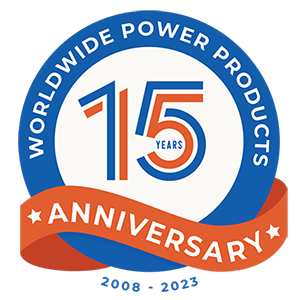Why Are Industrial Diesel Engines So Efficient?
Industrial diesel engines have been used for more than a century in myriad applications including power generation for the oil and gas industry. One of the main reasons for the success of this engine type is due to its internal combustion method which promotes engine efficiency and reduced fuel consumption.
No Spark – Efficiency Comes From Compressed Air
The internal combustion diesel engine ignites atomized fuel through injection into a combustion chamber. The compressed air in the cylinder is at an elevated temperature, so that there is instantaneous combustion without the need for a spark ignition source.
The diesel engine has the highest thermal efficiency of any internal combustion engine. With its high energy content (high energy density), diesel delivers more power than burning same volume of gasoline. Diesel fuel burns leaner than gasoline.
The diesel’s high compression ratios allow the engines to extract more power from the fuel during expansion of the hot exhaust. This greater expansion or compression ratio adds to the engine’s performance and also improves efficiency.
Fuel costs per kW produced with diesel engines is considerably less than with other engine fuel types. With its higher energy density, smaller amounts of fuel are consumed. The result is that diesel engines have a fuel efficiency that is normally thirty to fifty percent less than gas units.
Other Advantages Of Industrial Diesel Engines
Since the inception of their industrial use, diesel engines have continued making operational improvements and have overcome earlier disadvantages of higher noise and maintenance costs.
Diesel engines used for electric gensets often have lower maintenance costs. Because of their lower operating temperatures and no spark ignition system, they are generally easier to maintain. Their reliability is enhanced because the elimination of the electrical ignition system that diminishes any parasitic load on the engine and allows the engine to perform reliably in damper or colder climates. Diesel engines can operate reliably for long periods of time. For example, an 1800 rpm water cooled diesel unit can operate for 12,000 to 30,000 hours before any major maintenance is necessary. That same rpm water cooled gas unit typically operates for only 6000-10,000 hours before it needs servicing
Diesel engines are normally built with increased strength in its parts, needed because of the high level of compression and the higher generation of torque. The diesel fuel, distilled from petroleum as a light oil, provides increased lubricity to the cylinders and unit injectors, adding to its life.
If A Diesel Engine Is More Efficient, Isn’t It The Right Choice For Everyone?
While diesel engine design and operating features have made significant improvements, so too have natural gas and gasoline powered engines, allowing them to compete with diesels for use in rugged and remote service.
Fuel costs and availability can be a detriment to the use of diesel engines. In remote areas or anywhere there is access to a natural gas source, that energy is less expensive. Otherwise, diesel fuel has to be trucked to the site at a cost premium. The storage of the fuel, the possibility of fuel spills, and the risk of unavailability can also be a negative factors in relying on diesel.
Diesel engines, while there have been notable improvements made throughout their lifespan, are noisier. This factor often makes them impractical for some environments needing backup power generation. Examples may include hospitals, libraries, fire and police stations and other uses in populated areas.
The necessary robust construction of diesel generators makes them heavier and less mobile as they are necessarily comprised of large and heavy components. Thus, as opposed to smaller and lighter generators, diesel generators may not be the most preferred unit for portability.
While diesel units are widely used because of their many advantages, natural gas generators are closing the gap: With the development of new technologies in engines, enclosures and other components, the differences between diesel and natural gas generators is no longer so clearly defined.
Need Help Deciding Which Engine Type Is Right For Your Generator Set?
Deciding between the use of a diesel engine and generator set and a similar performing natural gas unit requires an understanding of the pros and cons of each. Worldwide Power Products has the knowledge and operating experience to assist with that decision. Contact us with your requirements and we will provide both the best advice and the best solutions available.
Decided On Using An Industrial Diesel Engine? Browse Our Inventory
We have a tremendous inventory of new and used engines, gensets and load banks to meet your needs. Our engineers, knowledgeable sales representatives and technicians are available to assist and match the equipment to your requirement.
Call us at 713-434-2300, go to our website at www.wpowerproducts.com or connect to our link at https://www.wpowerproducts.com/sales/industrial-diesel/ for a complete inventory of our available units.











